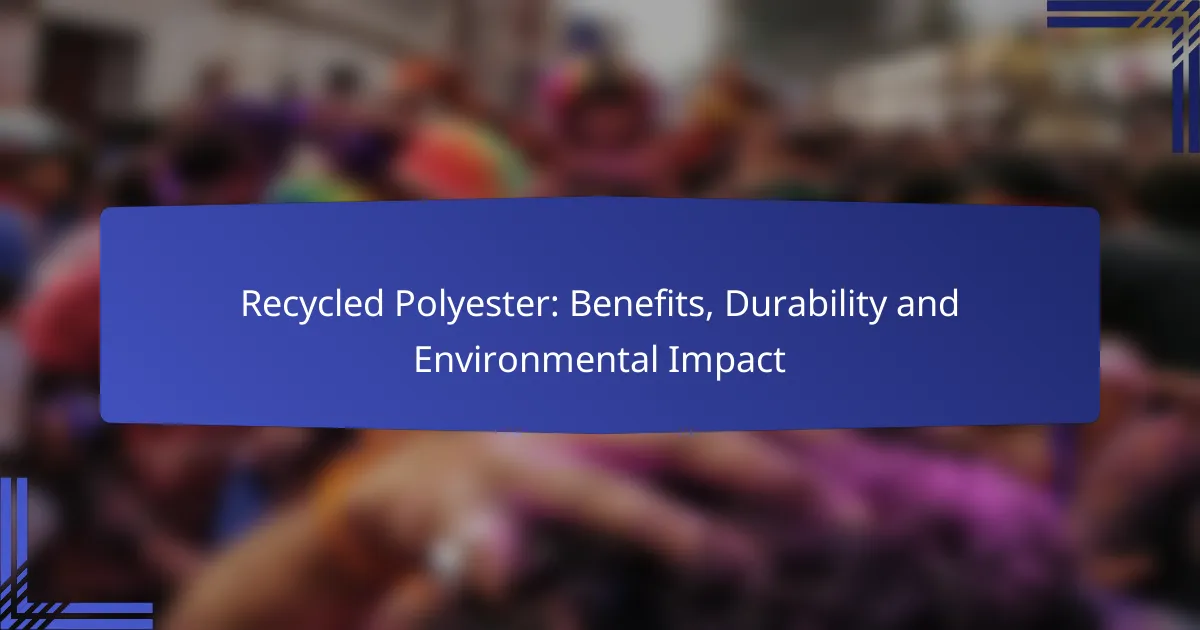Recycled polyester is a sustainable alternative that significantly reduces environmental impact while offering impressive durability and performance. By repurposing plastic waste, it not only conserves resources but also supports a circular economy, making it an ideal choice for eco-conscious consumers. Its resistance to wear and tear ensures longevity, comparable to traditional polyester, while contributing to a greener textile industry.
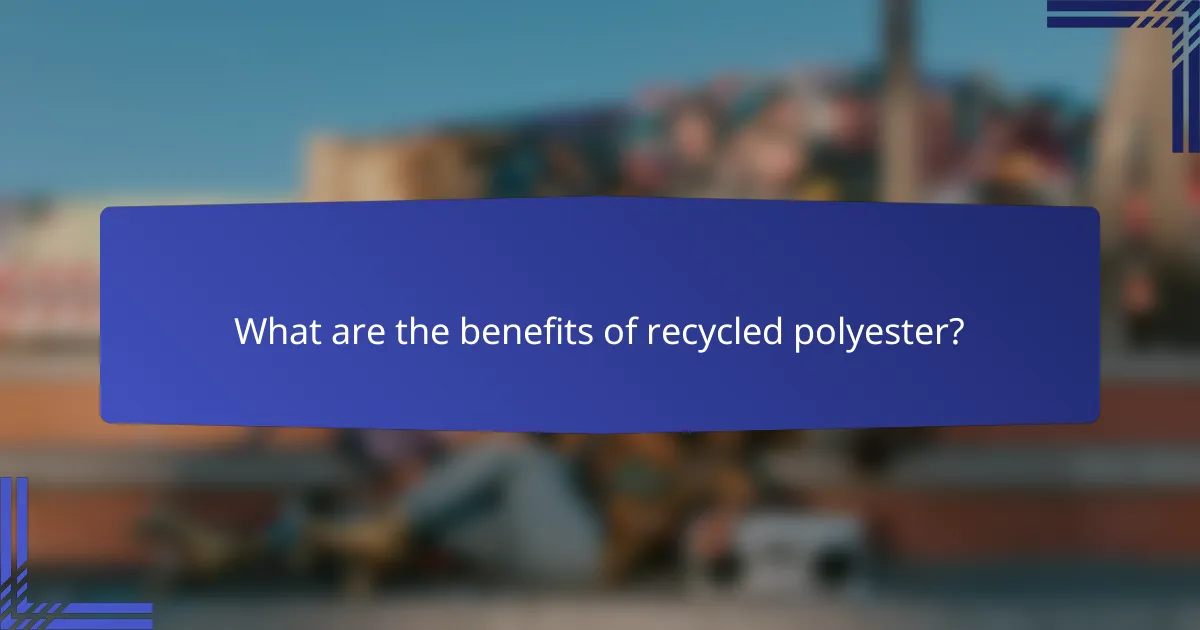
What are the benefits of recycled polyester?
Recycled polyester offers several advantages, including reduced environmental impact, energy savings during production, enhanced fabric properties, and support for a circular economy. These benefits make it a popular choice for sustainable fashion and textile industries.
Reduced environmental impact
Using recycled polyester significantly lowers the demand for virgin polyester, which is derived from petroleum. This shift helps decrease plastic waste in landfills and oceans, contributing to a cleaner environment. Additionally, it reduces the extraction of fossil fuels, which is crucial for combating climate change.
Recycled polyester can divert millions of plastic bottles from landfills each year, showcasing its potential to mitigate pollution. Brands that adopt this material often highlight their commitment to sustainability, appealing to eco-conscious consumers.
Energy savings in production
The production of recycled polyester generally requires less energy compared to virgin polyester. Estimates suggest that using recycled materials can save around 30-50% of the energy needed for traditional polyester production. This energy efficiency translates into lower carbon emissions, further benefiting the environment.
Manufacturers can often achieve these savings by using existing plastic waste, which bypasses the energy-intensive processes associated with extracting and refining crude oil. This makes recycled polyester a more sustainable option for fabric production.
Enhanced fabric properties
Recycled polyester retains many of the desirable properties of virgin polyester, such as durability, moisture-wicking, and quick-drying capabilities. In some cases, recycled polyester can even offer improved softness and texture, making it suitable for a variety of applications, from activewear to home textiles.
Moreover, advancements in technology have led to the development of recycled polyester fabrics that are not only functional but also aesthetically appealing. This versatility allows brands to create stylish products without compromising on sustainability.
Support for circular economy
Recycled polyester plays a crucial role in promoting a circular economy by encouraging the reuse of materials. This approach minimizes waste and maximizes resource efficiency, aligning with global sustainability goals. By integrating recycled materials into their supply chains, companies can reduce their overall environmental footprint.
Consumers also contribute to this circular model by choosing products made from recycled polyester, fostering a demand for sustainable practices. As awareness grows, more brands are likely to invest in recycling technologies, further enhancing the circular economy in the textile industry.
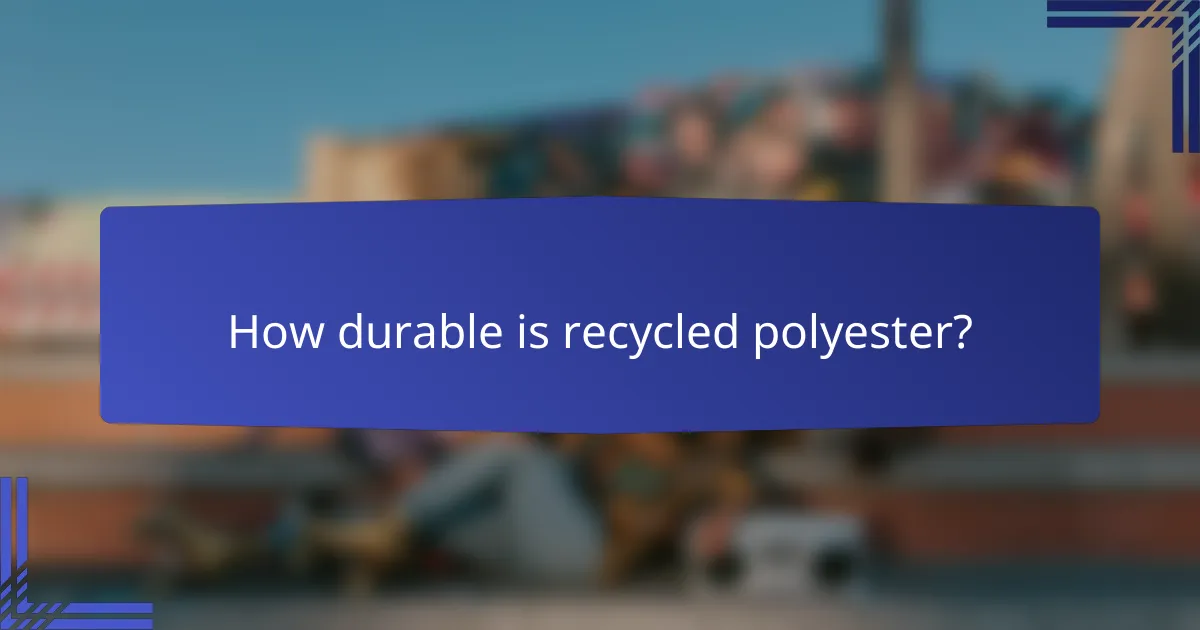
How durable is recycled polyester?
Recycled polyester is known for its impressive durability, making it a popular choice for various applications, from clothing to outdoor gear. Its resistance to wear and tear allows it to maintain performance over time, often comparable to virgin polyester.
Resistance to wear and tear
Recycled polyester exhibits strong resistance to wear and tear, which is crucial for items subjected to frequent use. This material can withstand abrasions, making it suitable for activewear and outdoor products. Its durability helps reduce the need for frequent replacements, contributing to sustainability.
In practical terms, garments made from recycled polyester can last several years with proper care, often showing minimal signs of wear even after extensive use.
Longevity compared to virgin polyester
When comparing longevity, recycled polyester generally performs similarly to virgin polyester. Both materials can last for many years, but recycled polyester offers an eco-friendly alternative without sacrificing durability. This longevity means that products made from recycled polyester can be a wise investment.
Additionally, the lifecycle of recycled polyester can be extended through proper maintenance, such as washing in cold water and avoiding high heat during drying.
Performance in various conditions
Recycled polyester performs well in a range of conditions, including moisture and temperature fluctuations. It is resistant to shrinking and stretching, which helps maintain the shape of garments and products. This adaptability makes it suitable for both indoor and outdoor use.
Moreover, recycled polyester dries quickly and wicks moisture away from the body, enhancing comfort during physical activities. This feature is particularly beneficial for sportswear and outdoor apparel.
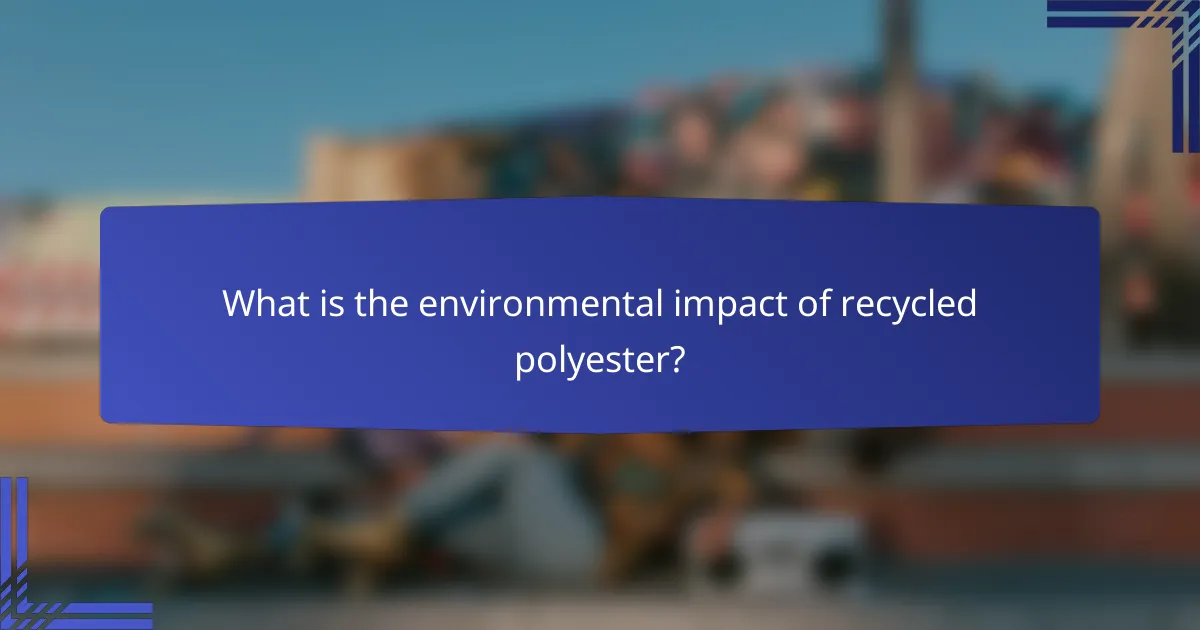
What is the environmental impact of recycled polyester?
The environmental impact of recycled polyester is generally positive, as it helps reduce waste and lower carbon emissions compared to virgin polyester. By repurposing plastic bottles and other materials, recycled polyester contributes to a more sustainable textile industry.
Lower carbon footprint
Recycled polyester has a significantly lower carbon footprint than its virgin counterpart. Producing recycled polyester can reduce greenhouse gas emissions by approximately 30-50%, depending on the production process and energy sources used. This reduction is crucial in the fight against climate change.
Using recycled materials also minimizes the need for petroleum extraction, further decreasing environmental harm. Brands that prioritize recycled polyester often highlight this benefit to appeal to eco-conscious consumers.
Reduction in plastic waste
Recycled polyester plays a vital role in reducing plastic waste in landfills and oceans. By converting discarded plastic bottles and other waste into fabric, the process diverts millions of tons of plastic from the waste stream each year. This not only helps clean up the environment but also reduces the demand for new plastic production.
For example, producing one kilogram of recycled polyester can prevent the disposal of about 2.5 kilograms of plastic waste. This circular approach encourages a more sustainable lifecycle for materials and promotes responsible consumption.
Water usage in production
The production of recycled polyester typically requires less water compared to virgin polyester. While exact figures can vary, it is estimated that recycled polyester can use up to 50% less water in its manufacturing process. This reduction is significant, especially in regions facing water scarcity.
Moreover, the lower water usage in recycled polyester production contributes to less water pollution, as fewer chemicals are involved in the recycling process compared to traditional polyester manufacturing. This aspect makes recycled polyester a more environmentally friendly choice for consumers and manufacturers alike.
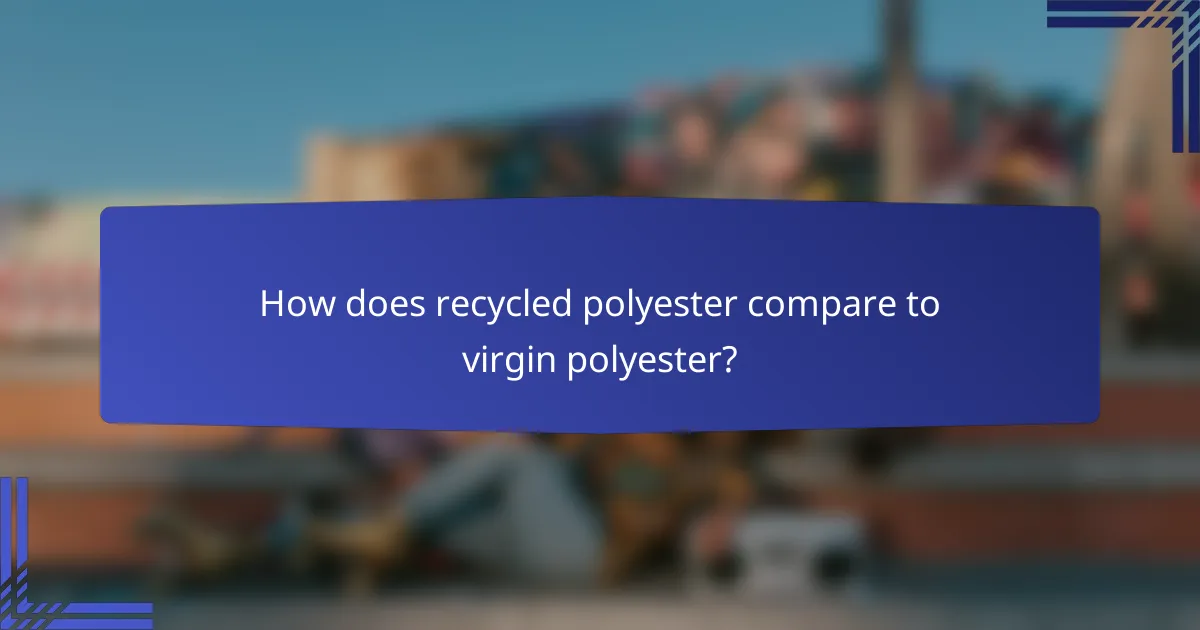
How does recycled polyester compare to virgin polyester?
Recycled polyester is made from post-consumer plastic waste, while virgin polyester is produced from petroleum-based resources. The key differences lie in cost, quality, and environmental impact, making recycled polyester a more sustainable option.
Cost differences
Recycled polyester generally has a slightly higher initial cost compared to virgin polyester due to the processing involved in recycling plastic waste. However, as technology advances and demand increases, the price gap is narrowing. In some markets, recycled polyester can be competitively priced, especially when considering the long-term environmental benefits.
Quality and performance comparison
In terms of quality, recycled polyester can match or even exceed the performance of virgin polyester in many applications. It offers similar durability, moisture-wicking properties, and color retention. However, some manufacturers may still prefer virgin polyester for specific high-performance applications due to perceived consistency in quality.
Market availability
The availability of recycled polyester is steadily increasing as more brands and manufacturers commit to sustainability. While it may not be as widely available as virgin polyester, many retailers are expanding their product lines to include recycled options. Consumers can find recycled polyester in various products, from clothing to home textiles, particularly in eco-conscious markets.
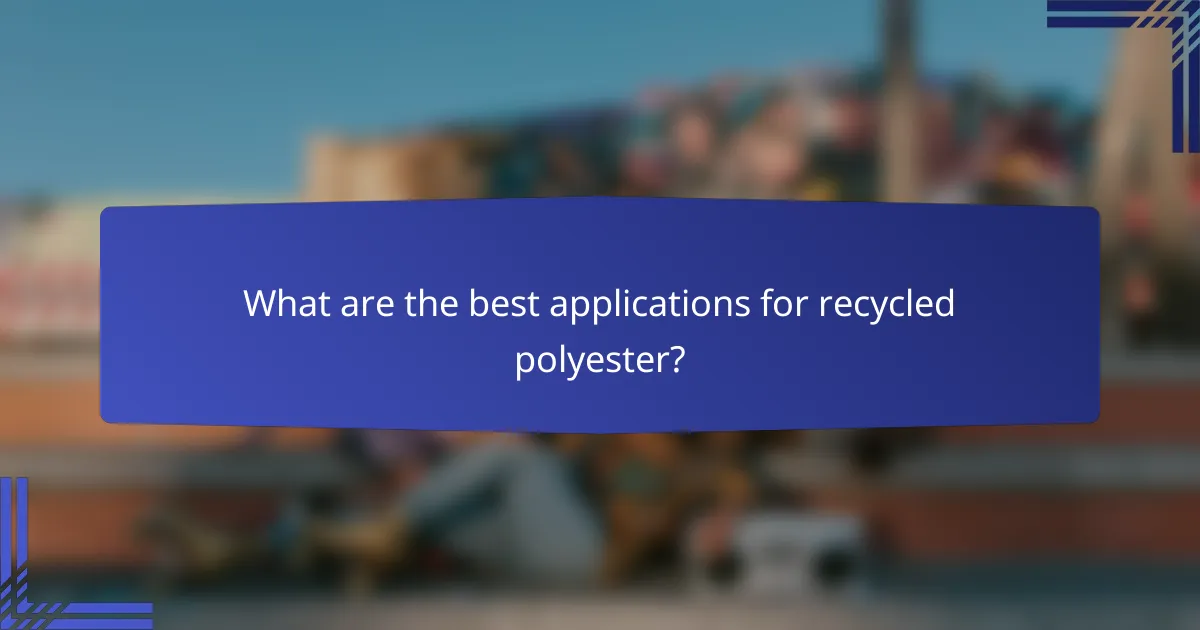
What are the best applications for recycled polyester?
Recycled polyester is highly versatile and can be used in various applications, primarily in fashion, home textiles, and outdoor gear. Its durability and eco-friendly properties make it an attractive choice for both manufacturers and consumers.
Fashion and apparel
Recycled polyester is increasingly popular in the fashion industry, used in everything from t-shirts to jackets. Brands often highlight its sustainability, appealing to environmentally conscious consumers. The fabric can mimic the feel and appearance of virgin polyester while reducing waste and resource consumption.
When choosing recycled polyester clothing, look for certifications like Global Recycled Standard (GRS) to ensure quality and sustainability. Additionally, consider the garment’s care instructions, as proper maintenance can extend its lifespan.
Home textiles
In home textiles, recycled polyester is commonly found in items such as curtains, cushions, and bedding. Its resistance to wrinkles and fading makes it a practical choice for everyday use. Moreover, using recycled materials helps divert plastic waste from landfills.
For home textile applications, check for labels that indicate the percentage of recycled content. This can help you make informed decisions about the environmental impact of your purchases.
Outdoor gear
Recycled polyester is ideal for outdoor gear, including jackets, backpacks, and tents, due to its durability and moisture-wicking properties. It can withstand harsh conditions while providing comfort and functionality for outdoor enthusiasts.
When selecting outdoor gear made from recycled polyester, consider the product’s performance features, such as waterproofing and breathability. Look for brands that prioritize sustainability and transparency in their manufacturing processes.
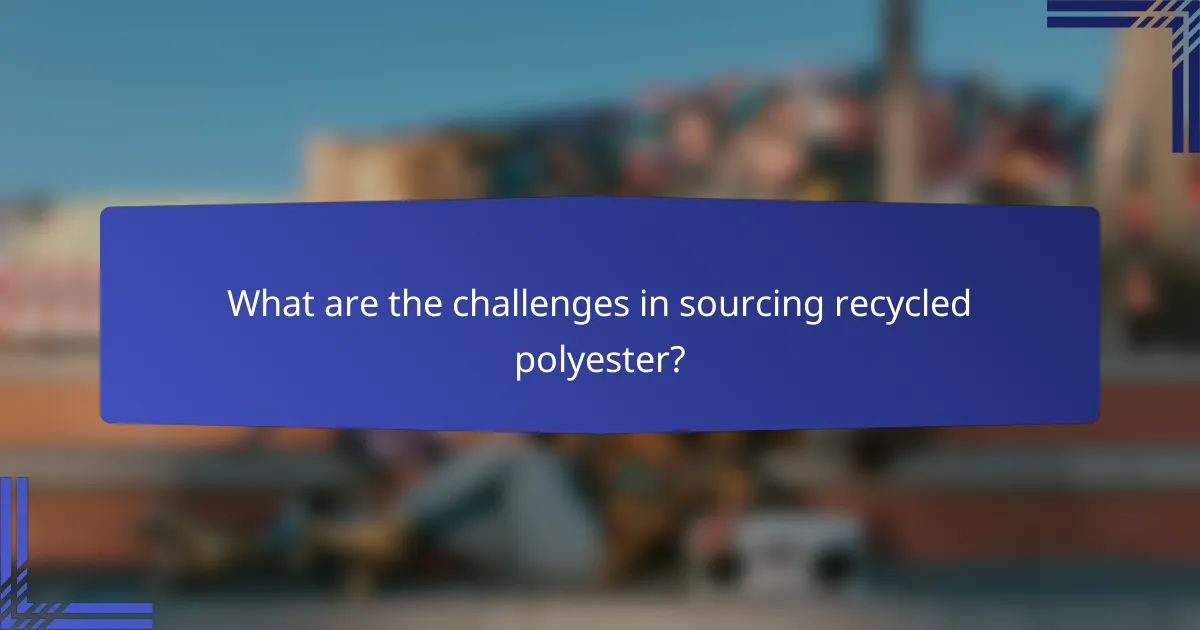
What are the challenges in sourcing recycled polyester?
Sourcing recycled polyester presents several challenges, primarily related to availability, quality control, and processing capabilities. The demand for recycled materials often outstrips supply, leading to variability in the quality of the recycled polyester produced.
Availability of raw materials
The availability of raw materials for recycled polyester can be inconsistent. Supply chains for post-consumer plastics, such as PET bottles, are often affected by local recycling rates and consumer behavior. Regions with robust recycling programs tend to have better access to high-quality feedstock.
Quality control issues
Quality control is a significant challenge when sourcing recycled polyester. Variations in the types of plastics collected can lead to inconsistencies in the final product. Manufacturers must implement rigorous testing and standards to ensure that the recycled polyester meets performance specifications.
Processing capabilities
Processing capabilities for recycled polyester can vary widely among manufacturers. Some facilities may lack the technology to effectively clean and process recycled materials, which can affect the quality and durability of the final product. Investing in advanced recycling technologies can help mitigate these issues.
